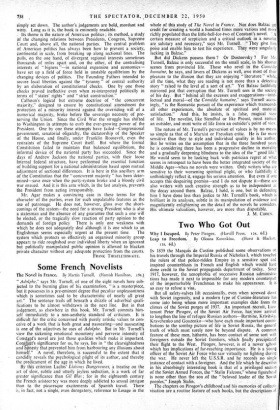American Politics
IN a famous passage in The American Commonwealth Bryce voiced the perplexity of Europeans at the nature of American political parties. Seventy years later Europeans are still mostly perplexed or disapproving. For Democrats and Republicans still fight under banners of many devices and quarterings, and it remains impossible to discern any simple clash of principle in the formal biennial tournaments staged across that great continent. The realisation that American parties rally, not for principles, but for power based on compromise, comes with a shock. Most of us are no content, as are the Americans themselves, to let it go at that ; but instead we assume with Bryce that American parties are in a state of decay or that they will grow out of their crudities when they achieve the maturity of European politics. And so we continue to make our false analogies between the Republican and the British Conservative Parties, to speculate about the rise of a truly American labour party and generally to indulge in vain hopes and fears about American political health.
Readers of Mr. Herbert Agar's new book will have no excuse for harbouring any such provincially European misconceptions. Writing as an old friend and now a resident of this country, he has succeeded in constructing exactly the book most likely to enlighten and, on the whole, to reassure us. In spite of its title this is not a treatise on political science, but a historical study. It deals, not with theories, but with men and events. Conceived on the grand scale, it conveys with narrative and biographical artistry a true feeling for the rich epic of America's past without ever losing the main thread of argument. Complex issues are simply set -down, The author's judgements are bold,,mordant and witty. Long as it is, the book is eminently readable. , Its theme is the nature of American politics ; its method, a study Of the changing relations between Presidents, Congress, Supreme Court and, above all, the national parties. The central problem of American politics has always been how to prevent a society, Continental in scale, from breaking up along sectional lines. The pulls, on the one hand, of divergent regional interests sometimes thousands of miles apart and, on the other, of the centralising interests of "bigness "—in national expansion and economics— have set up a field of force held in unstable equilibrium by the Changing devices of politics. The Founding Fathers intended to secure local liberties against the " tyranny " of central authority by an elaboration of constitutional Checks, One by one those checks proved ineffective even when re-interpreted politically in terms of "states' rights" and." strict construction."
Calhoun's logical but extreme doctrine of "the concurrent majority," designed to ensure by constitutional amendment the protection of a minority interest against the overriding will of a numerical majority, broke before the sovereign necessity of pre- serving the Union. Since the Civil War the struggle has shifted to Washington in attempts to curb the ever-growing power of the President. One by one these attempts have failed—Congressional government, senatorial oligarchy, the dictatorship of the Speaker of the House, and finally, under Franklin Roosevelt, even the restraints of the Supreme Court itself. But where the formal Constitution failed to maintain that -balanced equilibrium, the informal device of the national party has succeeded. Since the days of Andrew Jackson the national parties, with their loose Internal federal structure, have performed the essential function of building support for a national administration based upon mutual adjustment of sectional differences. It is here in this ancillary arm Of the Constitution that the "concurrent majority" has been deter- mined—save once when the party-system broke and a bloody civil war ensued. And it is this arm which, in the last analysis, prevents the President from acting irresponsibly.
• Mr. Agar makes a convincing case in these terms for the character of the parties, even for such unpalatable features as the use of patronage. He does not, however, gloss over the short- comings of the system—the need fbr a strong President who is also a statesman and the absence of any guarantee that such a one will be elected, or the tragically slow reaction of party opinion to the demands of foreign policy There is only one weakness with which he does not adequately deal although it Is one which to an Englishman seems especially urgent at the present time. The system which protects so effectively an organised minority group appears to ride roughshod over individual liberty when an ignorant but politically manipulated public opinion is allowed to blacken private character without any adequate protection from the courts.
FRANK THISTLETHWA1TE.



































 Previous page
Previous page